it is not only in the ability to paint, sketch and draw, but in other media as well
Labels
Monday, June 29, 2020
The measure would have required doctors who provide abortions to have admitting privileges at hospitals within 30 miles of a clinic
Painting murals gives students empowering role in protest movement
I'm reading "Painting murals gives students empowering role in protest movement" (Wisconsin State Journal):
Ask the schoolchildren to paint the murals "Black Life Matters" for downtown Madison.
As murals were being painted at the end of the school year, SJ Hemmerich, art teacher at Randall Elementary School, created a slide presentation of them. Hemmerich then presented it to students and as a last assignment asked , “If you could design your own mural for (Black Lives Matter), what would it be?” Then Hemmerich got the idea of why not do it for real.
Hemmerich, like other teachers, reached out to “Black and brown students” to get involved. Hemmerich got permission to work on one large mural and five panels located near each other. ... Hemmerich also sent an email out to art teachers in the Madison School District to recruit more help beyond Randall and wound up with more than 135 students and some staff members.
“I am really passionate about social justice work,” Hemmerich said. “I thought it would be a really good way to get students involved.”...
Monique Karlen, art teacher at La Follette High School, said she started by recruiting some of her students and then got other help from students from Middleton and East high schools...
The only mention of parents in the article is about one student who said that her parents worry about her participation in the protests, so the mural-painting is a good, safe alternative. But I don't think teachers should be recruiting children to engage in political activism — even if it's artistic — without first involving the parents and getting their consent. I don't think adults should put any sort of pressure on children to take a political position and to do political work — even if it's artwork. Teachers should not be exploiting their access to children for any political purpose. They are given access to our children for the purpose of education, and it is a solemn trust that should never be violated.
Sunday, June 21, 2020
Chris Wallace Grills Mercedes Schlapp On Failed Tulsa Rally: 'You Guys Look Silly When You Deny Reality'
DOJ SPOKESWOMAN: 'THE AMERICAN PEOPLE DESERVE RESOLUTION' OF DURHAM INVESTIGATION INTO RUSSIA PROBE
Department of Justice spokeswoman Kerri Kupec told "Hannity" Wednesday that "the American people deserve resolution" about exactly what happened in the early stages of the Russia investigation."[Connecticut U.S. Attorney] John Durham and his team have been thoroughly and meticulously working on their investigation for many months now, as the attorney referenced earlier this week ... " Kupec told host Sean Hannity.
Saturday, June 20, 2020
Oklahoma Supreme Court allows Trump rally to proceed as planned; Tulsa mayor rescinds curfew
"Is it me, or do we seem to have a problem with sculpture today? I don’t mean contemporary sculpture..."
"... whose fashionable stars (see Koons, Murakami et alia) pander to our appetite for spectacle and whatever’s new. I don’t mean ancient or even non-Western sculpture, either. I mean traditional European sculpture — celebrities like Bernini and Rodin aside — and American sculpture, too: the enormous universe of stuff we come across in churches and parks, at memorials and in museums like the Bode. The stuff Barnett Newman, the Abstract Expressionist painter, notoriously derided as objects we bump into when backing up to look at a painting.... [S]culpture skeptics from Leonardo through Hegel and Diderot have cultivated our prejudice against the medium. 'Carib art,' is how Baudelaire described sculpture, meaning that even the suavest, most sophisticated works of unearthly virtuosity by Enlightenment paragons like Canova and Thorvaldsen were tainted by the medium’s primitive, cultish origins. Racism notwithstanding, Baudelaire had a point. Sculpture does still bear something of the burden of its commemorative and didactic origins. It’s too literal, too direct, too steeped in religious ceremony and too complex for a historically amnesiac culture. We prefer the multicolored distractions of illusionism on flat surfaces, flickering in a movie theater or digitized on our laptops and smartphones, or painted on canvas. The marketplace ratifies our myopia, making headlines for megamillion-dollar sales of old master and Impressionist pictures but rarely for premodern sculptures...."
The new tag is something I'd thought about creating for a very long time. I've been interested in violence directed at art much longer than I've been writing this blog — at least as far back as 1974 — but somehow my resistance to tag proliferation kept me from breaking this subtopic out of my generic topics "sculpture" and "art." There was also the "protest" tag. "Destruction of art" is (usually) a subtopic of that one too. But the pulling down of statues of Junipero Serra and Francis Scott Key — last night in San Francisco — finally dragged me over the line.
Speaking of Junipero Serra, I remember Richard Serra and his "Tilted Arc." I was one of the workers of lower Manhattan in the 1980s who rankled at the hostility the artist expressed toward mere pedestrians. I've written about that a few times. The people in the plaza have feelings and interests and may richly resent the impositions of artist ego and elitist civic pride. Once art is in place, it demands admiration, and what happens? It might be ignored — that's what Kimmelman fretted about — and it might be attacked — the present-day rage.
I'd like to look up what the "sculpture skeptics" — Leonardo, Hegel, Diderot, Baudelaire, et al. — had to say. Oddly, they — at least some of them — expressed racism. The sculpture skeptics of today style themselves as anti-racists. But there's resonance in Kimmelman's summary of the skepticism:
Sculpture does still bear something of the burden of its commemorative and didactic origins. It’s too literal, too direct, too steeped in religious ceremony and too complex for a historically amnesiac culture. We prefer the multicolored distractions of illusionism on flat surfaces, flickering in a movie theater or digitized on our laptops and smartphones, or painted on canvas.We — some of us — prefer the multicolored distractions of illusionism on the flat surface of the embedded video on Twitter as protesters drag down another stately chunk of metal.
Friday, June 19, 2020
"Respect/Empower/Include."
Madisonians in shorts trudge past a mural of Barack and Michelle Obama that is painted on the boarded-up window of Which Wich Superior Sandwiches:
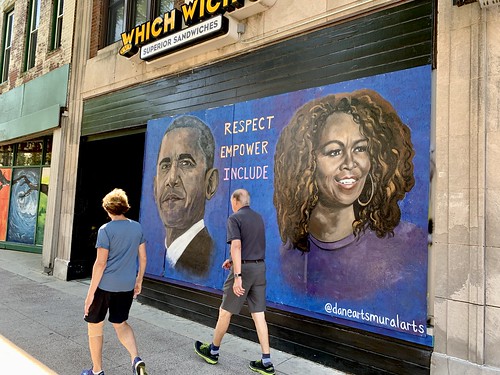
On the boarded-up window of the Madison Museum of Contemporary Art, a drooling troglodyte cop observes what might be a pile of burning doughnuts that give off smoke that reads — like a thought balloon — "Defund the Police":
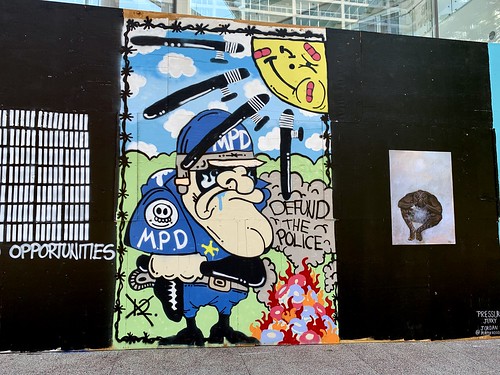
A longer view of the side of the museum featuring an ironic "Right turn only" sign:
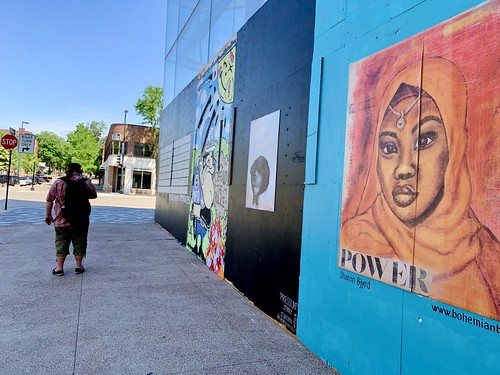
There's the notion that "being a revolutionary" has an element of being fun, loving, and beautiful:
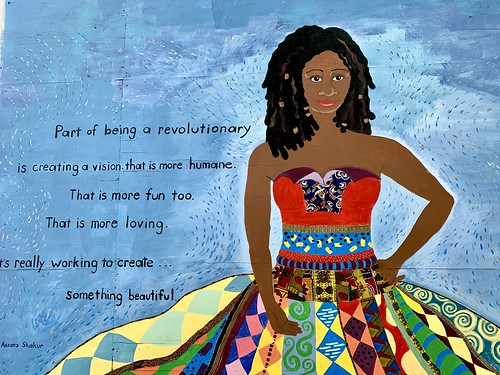
There's the grievance that you can't play your music really loud without people calling the cops:

More Madisonians trudging along, this time past dripping letters that few will read, but I'm seeing "Tell the President/To prepare the bunker/When he flee/Because until we see/Justice you will/Never see peace!"
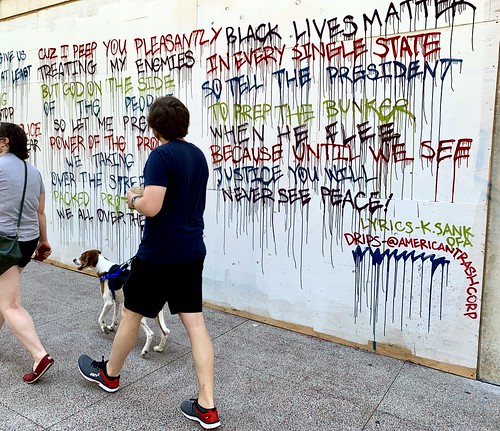
"Yes, we can!" the old President says, as a waiter sets up an outdoor café table.
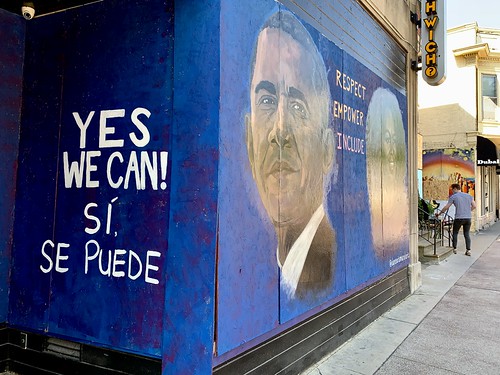
"Of course they despise Washington. Notice the graffiti '1619' on the toppled statue...."
Of course they despise Washington. Notice the graffiti “1619” on the toppled statue. And the burnt flags. The NYT must be proud. They taught these people well. https://t.co/4JTPEv2KMd
— Andrew Sullivan (@sullydish) June 19, 2020
In all my sunrise runs on this path, I'd never seen a deer before, and today, suddenly, up ahead, there were 2...
"Bolton is extremely famous for his fervent hawkery, including on the Iraq war. If Trump bothered to do a cursory Google search on Bolton before appointing him..."
From "Trump: I Didn’t Realize Bolton Supported Iraq War Until After I Hired Him" by Jonathan Chait (New York Magazine). Chait is reading the WSJ interview in which Trump says:
He had a lot of policy disputes, he and I. And after the first month or so, you know, I asked him one question. I said, “So, do you think you did the right thing by going into Iraq?” He said, “Yes.” And that’s when I lost him. And that was early on. That’s when I lost him. But no, I disagreed with much of the stuff he said. He was one of many people. I liked listening to many people, and then doing whatever is the right thing to do.
You didn’t ask him about Iraq before you brought him into the White House? If he regretted that?
No, but it didn’t … I knew all about his policy on Iraq. But that didn’t matter, frankly. Because he made a terrible mistake. And so did everybody else involved in Iraq and the Middle East, frankly. I never thought it was the right thing to do. And I’ve been proven right. But when he told me he still thinks it was the right thing to do, and was unable to explain it to me, I said, “Explain that to me, because I don’t think you can.’ And he could not explain it to me. So I said, “Do you say that just to make yourself feel good? Or do you say that because you really believe it?” He said, “I really believe it.” I said, “Well, then you’ve lost me because it’s just wrong.”...
[W]hen I asked him the question, so John, you were one of the people that were really pushing hard to go into the Middle East, to go into Iraq. Would you do it again? He said, Yes. And that’s where I said this guy is crazy.... I was talking to him. I said, So was that a mistake? I said, and it’s okay to admit you made a mistake, although that’s a big one. That’s a beauty. And I said, Do you think it was a mistake? And he said, No, I think it was the right thing to do. And I said, You know, you can’t explain that. You just can’t explain it.Why didn't Trump ask Bolton before he was hired whether in retrospect he still thinks it was the right decision to go into Iraq? Chait's answer is that that Trump is impulsive and reckless: He just didn't "bother." A more charitable reading of Trump — and I'm not saying the President deserves charity, just trying to balance things a little — is that he'd formed the opinion that everyone knows now that the Iraq War was a mistake. Trump was and is very proud of his opposition to the Iraq War, his astute perception from the beginning that it was a mistake. But he lacked the astute perception to see that there were still some people who believed the war was a good idea and to notice he was hiring one of those people.
You know this morning when I saw this tweet of Trump's...
Bolton’s book, which is getting terrible reviews, is a compilation of lies and made up stories, all intended to make me look bad. Many of the ridiculous statements he attributes to me were never made, pure fiction. Just trying to get even for firing him like the sick puppy he is!— Donald J. Trump (@realDonaldTrump) June 18, 2020
... I was going to snark You knew he was a snake.... you know Trump and that song lyric he's recited many times about the woman who takes in and nurtures a snake that ultimately bites and kills her?
“Oh shut up, silly woman,” said the reptile with a grinBut I guess Trump didn't know Bolton was a snake.
“You knew damn well I was a snake before you took me in
"I did something good: I made Juneteenth very famous. It’s actually an important event, an important time. But nobody had ever heard of it."
Yes, it's hyperbole. The "nobody" is outrageous and false. It gets your attention, and it increases the power of his fame-making machine, further inflating the importance of Juneteenth, and further connecting it to Trump, where it never belonged before.
__________________
*Link goes to Jonathan Chait at NY Magazine, quoting this WSJ interview. Chait:
... Trump has caused more people to become aware of Juneteenth, just as he has caused more people to become aware of the 25th Amendment, the Emoluments Clause, narcissistic personality disorder, “democratic backsliding,” the two-thirds threshold required for impeachment, and other concepts that had largely been excluded from daily news coverage. This has not been an era of progress. But it has been a time of enlightenment.What's "democratic backsliding"? I don't remember hearing that phrase before. I see it has a Wikipedia entry:
In political science, democratic backsliding, also known as democratic erosion or de-democratization, is a gradual decline in the quality of democracy.... Political scientist Nancy Bermeo has written that blatant forms of democratic backsliding such as classic, open-ended coups d'état and election-day fraud have declined since the end of the Cold War, while more subtle and "vexing" forms of backsliding have increased. The latter forms of backsliding entail the debilitation of democratic institutions from within....
Beginning in 2017, political scientists identified the United States under President Donald Trump as being in danger of democratic backsliding. In a 2019 journal article, political scientists Robert C. Lieberman, Suzanne Mettler, and others wrote that Trump's presidency presented a threat to the American democratic order because it simultaneously brought together three specific trends—"polarized two-party presidentialism; a polity fundamentally divided over membership and status in the political community, in ways structured by race and economic inequality; and the erosion of democratic norms"—for the first time in American history. Lieberman et al. noted that Trump has "repeatedly challenged the very legitimacy of the basic mechanics and norms of the American electoral process, invoking the specter of mass voter fraud, encouraging voter suppression, selectively attacking the Electoral College, and even threatening to disrupt the peaceful transfer of power" and noted that "Never in the modern era has a presidential candidate threatened to lock up his opponent; castigated people so publicly and repeatedly on the basis of their country of origin, religion, sex, disability, or military service record; or operated with no evident regard for facts or truth." In 2020, political scientists Alexander Cooley and Daniel Nexon, wrote that "the Trump administration has consistently de-emphasized the importance of human rights and democracy in its rhetoric and while adopting language and tropes similar to those of right-wing, illiberal movements." Colley and Nexon cited Trump's praise of autocratic rulers, his echoing of ethno-nationalist rhetoric, his efforts to deligitmize journalism and journalists as "fake news" and his policies erecting new barriers to refugees and asylum-seekers as similar to politics "found in backsliding regimes."
The 2019 annual democracy report of the V-Dem Institute at the University of Gothenburg found that the U.S. under Trump was among the world's liberal democracies experiencing "democratic erosion" (but not full-scale "democratic breakdown"). The report cited an increase in "polarization of society and disrespect in public deliberations" as well as Trump's attacks on the media and opposition and attempts to contain the judiciary and the legislation. The report concluded, however, that "American institutions appear to be withstanding these attempts to a significant degree," noting that Democrats had won a majority the House of Representatives in the 2018 midterm elections, which "seems to have reversed the trajectory of an increasingly unconstrained executive."
"Years ago, while working on a story for Rolling Stone about why so few white-collar offenders went to jail..."
Writes Matt Taibbi in "Why Policing Is Broken/Years of research on brutality cases shows that bad incentives in politics and city bureaucracies are major drivers of police violence" (Rolling Stone). Read the whole thing. The 4 headings are "Time Works Against Victims," "Abuse Records Are Secret," "Juking the Stats," and "‘Law and Order’ Wins Votes."
"If the Chief Justice believes his political judgment is so exquisite, I invite him to resign, travel to Iowa, and get elected. I suspect voters will find his strange views no more compelling than do the principled justices on the Court."
It's of a piece with the sort of rhetoric about judges I've been reading for the last 50 years and more. I can't remember a time when I was able to understand anything about the Supreme Court when there wasn't a notion that what they are really doing is politics. And I saw "Impeach Earl Warren" billboards when I was first learning to read — back when I had no idea what "impeach" meant (something about a peach?) or who Earl Warren was.
So it's an old, old theme. But it plays well, and I think Tom Cotton found a spiffy way to do the phrasing. Instead of calling Roberts unprincipled, he points to the other justices — "the principled justices" — and imagines them finding the Chief's "views" "strange" and uncompelling. That's a nice variation on the theme.
And you've got to give Cotton credit for complexity. He addresses the Chief Justice and invites him to do something he's obviously not going to do, though it's more realistic and respectful than the common insults that tell people to do things — like go to hell or kiss my ass — that they're not going to do. "Invite" is polite, and running for President is very grand. But the idea is that if you ran for President with your agenda, you would lose. Cotton predicts the loss in an elegant comparison of voters to "principled justices," who, he suspects, would have the same low opinion of the Chief's ideas.
Now, the so-called "principled justices" oppose the Chief because he's finding something in the law that actually belongs in the political decisionmaking process, and if the Chief were to run for President, he would be taking these ideas to the place where the "principled justices" say they belong. So if the voters rejected these ideas, it would not be for the same reason the "principled justices" rejected them.
Ah! Now, I see the little flaw in Cotton's rhetoric! The only way the voters and the so-called "principled justices" could share the same opinion of the Chief Justice's "strange views" would be if the "principled justices" were thinking in political terms — in which case, they would be no more principled than the Chief Justice.
But if Tom Cotton is reading this — hi, Tom! — I know you already know how to get off that hook. You only said the voters and the "principled justices" would find the Chief's views to be equivalently compelling. It can still be the case that these views are not compelling in court, because they are not law but merely political, and that they are not compelling in the political arena, because people just don't like them.
"The 'blue wall' is reforming in the Rust Belt."
In 2016, President Trump broke through Hillary Clinton’s “blue wall.” He won three states that Democrats had carried since the 1980s: Pennsylvania, Michigan and Wisconsin....First, "were he to garner 45 percent of their votes" — I just have to note the use of that word, "garner."
[N]ow, less than four years later, all three of those states have shifted again and presumptive Democratic nominee Joe Biden is leading Trump....
According to Pew Research Center’s analysis of the exit polls, [Hillary Clinton] earned only 37 percent of the white Catholic vote.... As poorly as Clinton did, the largest percentage point decrease for a Democratic candidate occurred between 2008 and 2012, which suggests that white Catholics had “soured” on Obama’s presidency before Trump declared for the presidency. Clinton should have seen this coming...
While it remains unlikely that Biden, a Catholic, will be able to pull a majority of white Catholics towards the Democratic Party in November, were he to garner 45 percent of their votes, it seems likely that Pennsylvania, Michigan and Wisconsin will again be colored blue....
The wall that Trump may have erected by November is not along the country’s southern border, but a blue one across the Rust Belt.
Second, I've said it before, and sometimes I think I'm the only one who feels this way, but "Rust Belt" is an offensive term. On November 9, 2016, I wrote:
Suddenly, the place where I live isn't called the "Blue Wall" or the "Fire Wall" anymore. It's: "Rust Belt."
When we ceased to operate to generate power for the Democratic Party, it was back to the old insult.
If you call us the "Rust Belt," you are saying our time has passed, that we once prospered because there was manufacturing, but it's gone and it's not coming back. That's not what Donald Trump said to us when he campaigned through the Midwest in 2016. Where is the optimism?
"White fragility is the sort of powerful notion that, once articulated, becomes easily recognizable and widely applicable.... But stare at it a little longer..."
Writes Carlos Lozada in "White fragility is real. But ‘White Fragility’ is flawed," reviewing the book "WHITE FRAGILITY: Why It’s So Hard for White People to Talk About Racism" in The Washington Post.
"America must seize on the moment and I truly believe — as I actually told the VP last night when I called him — that I think this is a moment to put a woman of color on that ticket."
I think we all already knew her chance was blown:
In the immediate aftermath of Floyd’s killing, Klobuchar’s time as chief prosecutor for Hennepin County came back under scrutiny, specifically the lack of prosecutions she pursued in cases of police brutality....So what I hear in her effort at a high-minded statement is an undercutting of the other women who are in the running. First, Elizabeth Warren — who is not a woman of color except in her memory of younger days when family lore and a desire to identify were enough. Why step on her chances, Amy? Second, all the various black women who are in the running. Amy is ensuring that when one of them is picked, everyone will believe they were picked because of their race.
Asked if those questions about her past record on police brutality would have made it harder for her in the role of vice presidential nominee, Klobuchar said Thursday: "I think I could've functioned fine and there's a lot of untruths out there about my record and now is not the time to debate those."
Thursday, June 18, 2020
At the Sunrise Café...

... you can write about anything you want.
Meade took this picture of me looking at the sunrise at 5:24.
And let me remind you about the Althouse Portal to Amazon.
"Trump Can’t Immediately End DACA, Supreme Court Rules."
Chief Justice John G. Roberts Jr. wrote the majority opinion, joined by the court’s four more liberal members in upholding the program, Deferred Action for Childhood Arrivals, or DACA.
“We do not decide whether DACA or its rescission are sound policies,” the chief justice wrote. “We address only whether the agency complied with the procedural requirement that it provide a reasoned explanation for its action.”... Chief Justice Roberts... said the administration may try again to provide adequate reasons for shutting down the program....
In a dissent, Justice Clarence Thomas, joined by Justices Samuel A. Alito and Neil M. Gorsuch, said the majority had been swayed by sympathy and politics. 'Today’s decision must be recognized for what it is: an effort to avoid a politically controversial but legally correct decision,' Justice Thomas wrote. The court could have made clear that the solution respondents seek must come from the legislative branch. In doing so.... it has given the green light for future political battles to be fought in this court rather than where they rightfully belong — the political branches."
"Facebook on Thursday said it had take action against ads run by President Trump's re-election campaign for breaching its policies on hate."
CNN Business Reports.
John Bolton's book "has been written with so little discernible attention to style and narrative form that he apparently presumes an audience that is hanging on his every word."
... Bolton has filled this book’s nearly 500 pages with minute and often extraneous details, including the time and length of routine meetings and even, at one point, a nap. Underneath it all courses a festering obsession with his enemies, both abroad (Iran, North Korea) and at home (the media, “the High-Minded,” the former defense secretary Jim Mattis). The book is bloated with self-importance, even though what it mostly recounts is Bolton not being able to accomplish very much. It toggles between two discordant registers: exceedingly tedious and slightly unhinged....
In another book by another writer, such anecdotes might land with a stunning force, but Bolton fails to present them that way, leaving them to swim in a stew of superfluous detail. Besides, the moment he cites as the real “turning point” for him in the administration had to do with an attack on Iran that, to Bolton’s abject disappointment, didn’t happen....
... Trump decided to call off the strikes at the very last minute, after learning they would kill as many as 150 people. “Too many body bags,” Trump told him. “Not proportionate.” Bolton still seems incensed at this unexpected display of caution and humanity on the part of Trump, deeming it “the most irrational thing I ever witnessed any President do.”...
[H]is chapter on Ukraine is weird, circuitous and generally confounding. It’s full of his usual small-bore detail, but on the bigger, more pointed questions, the sentences get windy and conspicuously opaque.... ... Bolton — known for what a 2019 profile in The New Yorker called his “tremendous powers of recall” — said it was too much for him to fully understand....
It’s a strange experience reading a book that begins with repeated salvos about “the intellectually lazy” by an author who refuses to think through anything very hard himself.
5:22 a.m.

That's today, the 9th of the 10 days with the earliest sunrise time, 5:17.
I was there at 5:17, but the sun had not yet broken over the shoreline.

I don't have a view of the horizon. The first direct bit of sun became visible at 5:20:

You see why I picked 5:22 as the best. It wasn't because I was 5 minutes "late." I wasn't late! Were you?
I'm going to do something today that I've never done before.
IN THE COMMENTS: The second commenter, Rockeye said:
Going shooting. A boy can hope.That's the answer. I shot a gun!
I had 2 hours of training and practice at shooting range.
AND: Here's my new post with video.
"I admit to having a complicated relationship with Aunt Jemima... For a period of time in the late 1940s and early 1950s, my grandmother, Ione Brown..."
You tried to make us ashamed of what Aunt Jemima stood for."
From "Why did it take so long to set Aunt Jemima free?" by Michele L. Norris (WaPo). (Quaker Foods announced that it is retiring the Aunt Jemima brand because to "make progress toward racial equality.")
ADDED: At the NY Post, I'm seeing "After Aunt Jemima, people call to cancel Uncle Ben’s and Mrs. Butterworth’s." I understand about Uncle Ben, but Mrs. Butterworth? I've never perceived Mrs. Butterworth as black.
The syrup, sold in a matronly woman-shaped bottle, is accused of being rooted in mammy culture and was modeled after the body of Thelma “Butterfly” McQueen, the black actress who played Prissy in “Gone With The Wind.” The Jim Crow-era “mammy” character was often used to show that black women were happy working in white households....That's news to me. I looked up Mrs. Butterworth on Wikipedia and it did not contain that information. I did learn that the voice for the character was done by Mary Kay Bergman, who looked like this:
"Her parents were Jewish," and she died by suicide at the age of 38 in 1999. She was the original lead female voice on "South Park."
Her characters included Liane Cartman, Sheila Broflovski, Shelly Marsh, Sharon Marsh, Carol McCormick and Wendy Testaburger.... Bergman credited South Park for pulling her out of a typecasting rut. 'I'm known for these sweet, cute little characters,' she said, noting her roles in various Disney films. "So I've been doing them forever. My agents were trying to submit me on shows that are edgy, and they're laughing, 'Mary Kay, are you kidding? No way!'" After Bergman's death, the two episodes "Starvin' Marvin in Space" (the final episode for which she recorded original dialogue) and "Mr. Hankey's Christmas Classics" (the final episode in which her voice was used via archive footage) were dedicated in her memory.No comment on the role of Starvin' Marvin and Mr. Hankey in the quest for progress toward racial equality. RIP Mary Kay Bergman. Watch this (it's phenomenal):
Mrs. Butterworth voice at 1:11.
ADDED: Norris writes that her grandmother, in the role of Aunt Jemima had to use a "kind of broken patois." And I see in the comments that David Begley is asking, "Just asking, but isn’t 'broken patois' the language of today’s rap music?" Which makes me wonder, what's wrong with a patois? To answer my own question, I naturally look up "patois" in the OED.
I see that it's "dialect spoken by the people of a particular region (esp. of France or French-speaking Switzerland), and differing substantially from the standard written language of the country" or — and this is "frequently depreciative" — "a regional dialect; a variety of language specific to a particular area, nationality, etc., which is considered to differ from the standard or orthodox version."
I was intrigued by this example from "The Sheltering Sky" by Paul Bowles (who was born in New York City):
Then he remembered having heard that Americans did not speak English in any case, that they had a patois which only they could understand among themselves. The most unpleasant part of the situation to him was the fact that he would be in bed, while the American would be free to roam about the room, would enjoy all the advantages, physical and moral.
"As the book nears publication and details spill out, many congressional Democrats quickly assailed Mr. Bolton for not telling his story during the impeachment proceedings and instead saving it for his $2 million book."
From "Five Takeaways From John Bolton’s Memoir 'The Room Where It Happened' describes Mr. Bolton’s 17 turbulent months at President Trump’s side through a multitude of crises and foreign policy challenges" by Peter Baker (NYT).
ADDED:
Wacko John Bolton’s “exceedingly tedious”(New York Times) book is made up of lies & fake stories. Said all good about me, in print, until the day I fired him. A disgruntled boring fool who only wanted to go to war. Never had a clue, was ostracized & happily dumped. What a dope!
— Donald J. Trump (@realDonaldTrump) June 18, 2020
"Hours after the Fulton County district attorney announced felony murder and other charges against the former Atlanta police officer who fatally shot Rayshard Brooks... a number of Atlanta police officers called in sick just before a shift change Wednesday evening."
WaPo reports.
In the comments over there, somebody says:
They harassed the guy for 45 minutes and when he panicked and grabbed their taser, they shot him when he was running away. Then kicked him. Sorry guys, if you think that's what policing is, you should be calling in sick.That draws this sarcasm:
Why do these cops think someone like Dylann Roof should be gently apprehended (and given a cheeseburger) but a black guy should be harassed? And that he isn't expected to panic? And that those cops couldn't let him run, and go after him later?
Cops should wait until 0.1 milliseconds before the stun gun barb pierces the cornea of the eyeball before shooting the perpetrator in the kneecap of their non-dominant leg to slow him down and then snuggle him into compliance.
"Reading Justice Gorsuch’s Bostock opinion, I was thrown back to the summer of 2017, when I found myself in a social gathering of a half dozen fellow progressives and one prominent conservative lawyer..."
Writes Linda Greenhouse in "What Does ‘Sex’ Mean? The Supreme Court Answers/We’ll soon find out whether the court inflames the culture wars or cools them as its term winds down" (NYT).
The top-rated comment over there:
Forgive my cynicism, but I suspect that Roberts, being acutely aware of how politically biased his court appears, decided to select this case as a means of deflecting attention from the flood of conservative opinions yet to come. Having determined that they already lost the culture war on LGBT equality, they tossed progressives this bone, fully prepared to nullify it with a decision that it can be ignored by people with "sincerely held beliefs." They will point to this case as evidence of their neutrality.
Wednesday, June 17, 2020
At the Pre-Dawn Café...

... you can write about whatever you want.
The photo was taken at 5:10 a.m. today, the 8th of the 10 days when the sun rises at 5:17, the earliest sunrise time of the year.
And please remember to use the Althouse Portal when you need to do some Amazon shopping. I really appreciate your support for this blog.
"Unlike many artists who reacted to the pandemic with a kind of dutiful tenderness—'Let me help with my song!'—Dylan has decided not to offer comfort, nor to hint at some vague solidarity."
You can tell by the diaeresis in "reëstablished" that it's The New Yorker. Amanda Petrusich reviews Bob Dylan's new album, "Rough and Rowdy Ways," which will be released on Friday.
Petrusich sure is putting a lot of her own clunky words into Bob Dylan's mouth. She's insisting that he's insisting — insisting that everything is American racism. Why would you go and assume that what he's saying is what you're fired up to think everybody is supposed to be saying right now?
She did say "for me." You can listen to whatever you want any way you want.
"With the slogan 'Silence is Violence' being used at the law school, there will be enormous pressure for student groups to go along. Not to do so would be deemed an act of 'violence.'"
This is an attempt not just to scare students away from my course, but to scare students away from speaking their minds, and to create a faculty and student purity test.
I have received numerous emails from students telling me I have a lot of “quiet” support at the law school, but that students are afraid to speak out for fear of career-ending false accusations of racism....
This toxic atmosphere didn’t need to take place. At a time when the law school desperately needs an adult in the room, so to speak, we have faculty and a Dean who denounce me.
Can the cop cry?
I'm going to take a contrarian position on this: a lot of us have tremendous stress in our lives right now and it comes out in different ways. We're assuming the worst about her just like she's assuming the worst of McDonalds. No need to shame her. https://t.co/hQkhnisQoM
— Michael Ian Black (@michaelianblack) June 17, 2020
"Scroll casually through your platform of choice and you’ll see kids. Kids protesting on Pinterest; kids posing on Instagram..."
Writes Jennifer Weiner in "Should Any Parents Be Instagramming Their Kids?/Sure, those of us who do may not all be Myka Stauffers. But we’re all selling some kind of story about ourselves, and using our children to do so" (NYT).
Should have?
The man is dead. There's NOTHING he should have done.
Why not say "Why Scalia would have loved the Supreme Court’s Title VII decision"? I think I know why. The article is by George Conway. It's in WaPo. I'm going to say: They don't want to concede that Scalia would have joined the majority in this case, that he would have stuck to his principles (and that this case was truly an instance where these principles dictated the outcome the majority reached).
Popular Posts
-
"When Trump was 13, he and a friend started collecting switchblades that they’d play with in parks.""Donald’s father, Fred Trump, already alarmed by his behavior in school and in church, promptly shipped him off to NYMA to be straighte...
-
Going through home design should be a natural part of for a property owner. Having a your home could unsurprisingly consist of restoring de...
-
Just a line from Tom Cotton I wanted to memorialize, quoted at Fox News . It's of a piece with the sort of rhetoric about judges I'v...
-
Headline at The Intercept. The judge is Laurence Silberman of the D.C. Circuit. Silberman [wrote]... that his great-grandfather had fought f...
-
Desinfektan Cap Gadjah Sulfur Carbendazim & Fungisida Obat Penghilang Bau Amonia Kandang Biosecuriti no 1 sulfur carbendazim dosis ...
-
Fox News host Chris Wallace challenged Trump 2020 campaign spokesperson Mercedes Schlapp for making "campaign speeches" during ...
-
Writes Yascha Mounk (in The Atlantic). He offers "three crucial facts" that show it's wrong to tell people to "stay calm...
-
"'By comparing the available genome sequence data for known coronavirus strains, we can firmly determine that SARS-CoV-2 originated...
-
WASHINGTON — The Supreme Court ruled Monday that Louisiana's tough restriction on abortions violates the Constitution, a surprisin...
-
I'm reading "Painting murals gives students empowering role in protest movement" (Wisconsin State Journal): For Madison-a...
My Blog List
-
-
-
DESINFEKTAN CAP BADAK5 months ago
-
-
-
DESINFEKTAN KANDANG1 year ago
-
DESINFEKTAN KANDANG HEWAN TERBAGUS1 year ago
-
-
-
-
-
-
-
Blog Archive
-
▼
2020
(456)
-
▼
June
(156)
- The measure would have required doctors who provid...
- Painting murals gives students empowering role in ...
- Chris Wallace Grills Mercedes Schlapp On Failed Tu...
- DOJ SPOKESWOMAN: 'THE AMERICAN PEOPLE DESERVE RESO...
- Oklahoma Supreme Court allows Trump rally to proce...
- "Is it me, or do we seem to have a problem with sc...
- "Is support for free speech correlated with intell...
- "Respect/Empower/Include."
- "Of course they despise Washington. Notice the gra...
- In all my sunrise runs on this path, I'd never see...
- "Bolton is extremely famous for his fervent hawker...
- "I did something good: I made Juneteenth very famo...
- "Years ago, while working on a story for Rolling S...
- "If the Chief Justice believes his political judgm...
- "The 'blue wall' is reforming in the Rust Belt."
- "White fragility is the sort of powerful notion th...
- "America must seize on the moment and I truly beli...
- At the Sunrise Café...
- I told you I was going to do something today that ...
- "Trump Can’t Immediately End DACA, Supreme Court R...
- "Facebook on Thursday said it had take action agai...
- John Bolton's book "has been written with so littl...
- 5:22 a.m.
- I'm going to do something today that I've never do...
- "I admit to having a complicated relationship with...
- "As the book nears publication and details spill o...
- "Hours after the Fulton County district attorney a...
- "Reading Justice Gorsuch’s Bostock opinion, I was ...
- At the Pre-Dawn Café...
- "Unlike many artists who reacted to the pandemic w...
- "With the slogan 'Silence is Violence' being used ...
- Can the cop cry?
- "Scroll casually through your platform of choice a...
- Should have?
- "I wasn’t always quite as comfortable with queerin...
- I didn't think it would work...
- "The trouble with drinking is sipping. Give us wat...
- "Federal judge lambastes amendment to rename confe...
- The Interactive Social Contract.
- What I wanted to learn.
- "Should you happen to find yourself near a statue ...
- At the Sunrise Café...
- "Shortly before Elizabeth Warren joined their virt...
- "Patients with underlying conditions were 12 times...
- "The administration has been working to pursue a n...
- "In the first presidential race in which the combi...
- At the Sunrise Café...
- "We've researched it and it has nothing to do with...
- "Amid calls for taking down statues tied to France...
- Why are college students ever trusted to run their...
- "Today, we must decide whether an employer can fir...
- "The book will... allege that Trump and his father...
- "'Now there’s an IQ test,' said another prominent ...
- Fists — a blackface fist and Biden doing fists.
- "The scope of what some museums now call 'rapid re...
- "The only thing I’ll tell you is she never spoke d...
- At the Sunrise Café...
- "... without barely a wimpier..."
- "It was while in the lower house of Congress that ...
- Trump retweets Michael Moore.
- "So... I don't get what's 'problematic' with Madon...
- Wild indigo.
- "We will not sell facial-recognition technology to...
- "[W]hen things get real — really murderous, really...
- "Melania has been overheard referring to Ivanka as...
- "I’d just like to say Woody Allen is a great, grea...
- Is there something physically wrong with President...
- Sunrise, 5:19.
- "While Melania stayed in New York, Ivanka continue...
- At the Third Quarter Café...
- Would the person named Yin who is trying to commen...
- "So dogmatic was the dictate that we all stay at h...
- "John Bolton, Donald Trump’s former national secur...
- "Jonathan Turley rips Cornell Law faculty letter a...
- "We're supposed to be for each other! We're suppos...
- "There is little or no liberal space in this revol...
- "Each passing day sees more scenes that recall som...
- Lake Mendota at 4:49 a.m.
- "No. You can not base your life on frowning and gl...
- "We can say we’re going to cancel her, but she’s g...
- At the Sunrise Café...
- "Do you think about mortality often?"/"I think abo...
- Outrageous pessimism at the NYT: "On the Future, A...
- "A 56-year-old North Dakota [woman] drowned in a g...
- "U.S. Olympic team boxer Virginia Fuchs will face ...
- "Simon told police that he was walking his dog wit...
- "Yes, racism is real, but as a crucial factor that...
- How shocking is "And they went in and it was like ...
- A new Dave Chappelle special — "8:46" — and you ca...
- "We want law and order. We have to have a lot of g...
- At the Waning Gibbous Café...
- They're back... the celebrities...
- "Ever since I started Legal Insurrection in Octobe...
- "Right now, our model thinks Joe Biden is likely t...
- What does a bird symbolize?
- "Meanwhile, President Donald Trump is planning to ...
- "Tiny worms often breed in the mish, but are not d...
- "Transgender women are women. Any statement to the...
- "A growing chorus of economists is seeking to disl...
- "On the new rebel state’s first night, the atmosph...
-
▼
June
(156)




